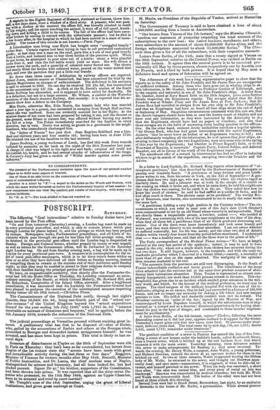In a letter to Lord Carlisle, Dr. Richard King reports
other instances of "at- mospheric pestilence," like that described by the Harbourmaster of Ramsgate as
passing over Goodwin Sands. "A gentleman of large fortune and great intelli- gence writes to me, from his estate at York, on the 23d of September—' A gen- tleman died here two days ago, who was at Salisbury when the cholera raged so
fearfully. there. He said a labourer was at work in the steeple of a church on the evening on which it broke out, and when he came down he told his neighbours that the cholera was coming, for he smelt it in the air. • They asked him how he nel-the-smell of cholera: be said he had sialVed ass soldier in India, and he bad often smelt it there. The cholera came as'he predieted: The worthy Rec- tor of Breamore, near Sarum, also commuiticated to me in nearly the same words the same fact.
"A gentleman holding a very high position in the Customs writes—' The cir- cumstances to which you refer in your note of this day's date (11th October) were communicated to me by an old friend whose veracity is unimpeachable. They are shortly these: a respectable person, a butcher, named —, who resided at Walworth, was conversing with two of his near neighbours at the door of his shop,
when they all three felt a pestiferous blast of air which produced distressing sen-
sations. One of the three went home immediately and took some brandy and water, and then went directly to his medical attendant. I am not aware whether
he suffered materially, but his life was saved; and the other two died of Asiatic cholera within twenty-four hours from the period before-mentioned. I understood that — was a healthy,man, and that all the three were in the prime of life.'"
The Paris correspondent of the Medical Times writes—" We have at length arrived at the very last period of the epidemic; indeed, it may be said to have ceased in the city, where not a single death from cholera has occurred during the last two days. It still lingers, however, in the hospitals, and with the same re- markable peculiarity which I Observed in a former letter,—namely, a mortality of more than 50 per cent on the cases admitted. The malignity of the epidemic thus remains unabated to the end.
"The accounts from the provinces are still very discouraging. In the South of France indescribable confusion and terror prevail. The inhabitants of the large
cities attacked take the extreme but at the same time prudent measure of aban-
doning their habitations altogether. Thus, Toulon is represented as almost com- pletely depopulated; not more than 10;000 persona remain in the town. This cho-
leraphobia has given rise to an incident which excited great sensation in the mili-
tary world, and which, for the honour of the medical profession, we trust may be unique. The chief surgeon of the military hospital fled with the rest of the in-
habitants; alleging as an excuse, that he had just succeeded to a fortune of 100,000
francs, and saw no longer any necessity for risking a life which had now become precious to him. His selfish and dastardly conduct soon met its reward. The Moniteur contains an 'order of the day,' signed by the Minister of War, and countersigned by Louis Napoleon himself, in which the unfortunate man is stig- matized as 'a coward and as a deserter,' dismissed ignominiously for having aban- doned his post in the hour of danger, and condemned to three months' imprison- ment for pusillanimity." A letter from Berlin, of the 8th instant, says—" Cholera, following the same descending course as it did last year, appears inclined to disappear for the winter. Yesterday's report gives only four new cases, none fatal. Of persons under treat- ment, however, three died. The total cases up to mid-day, 7th, are 5,265; deaths 3,441, cured 1,712; remainder under treatment"


























 Previous page
Previous page